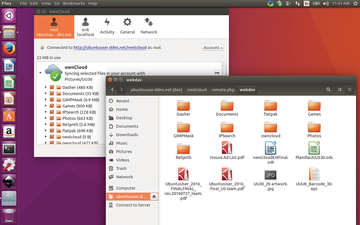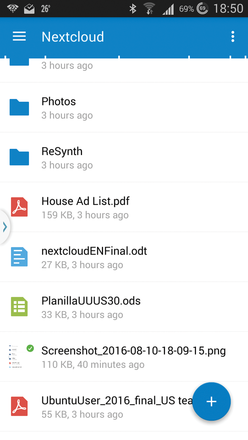Installing and testing Nextcloud
|
Clients
You don't need to open a browser to access the Nextcloud installation. Network-capable file managers like Files, Nautilus from Gnome, or Dolphin from KDE can open the cloud storage platform via WebDAV without opening additional programs.
To use this method, open your files explorer (Files in Unity), click on Connect to Server and enter a URL corresponding to a file (e.g., davs://<yourserver>.ddns.net/nextcloud/remote.php/webdav ). If you are using Dolphin, replace the protocol component at the beginning of the URL with webdav://[...] . Now you can work with data that is stored remotely in the same way you work with local files. To synchronize files and folders between connected computers with Nextcloud, you need a client program. Presently, Nextcloud only offers a proprietary app for Android users, and desktop users still have to rely on the ownCloud client (Figure 7).
 Figure 7: Users with desktop computers still rely on the ownCloud client. Alternatively, you can open data stored in the cloud with a WebDAV-capable file manager.
Figure 7: Users with desktop computers still rely on the ownCloud client. Alternatively, you can open data stored in the cloud with a WebDAV-capable file manager.
Desktop clients have become part of the package sources for various distributions. For example, under Debian and Ubuntu, look for owncloud-client . When you have installed the client, enter the URL https://<yourserver>.ddns.net/nextcloud as the server address. To avoid confusion, it is best to make the storage location ~/Nextcloud instead of ~/ownCloud . Once installation is complete, the client copies the data currently stored on the server to the directory that has been selected.
The Nextcloud app for Android is installed from the Google Play Store [9]. This smartphone app looks very much like the ownCloud original except that it has a different color scheme (Figure 8). Unlike the ownCloud app, the Nextcloud app comes free of charge. The ownCloud app is also covered by a free license, but you either have to pay EUR0.79 or install it via the F-Droid open source market [10]. The iOS app for Nextcloud [11] costs $0.99, and the ownCloud app for Apple devices [12] should also work with Nextcloud installations.
 Figure 8: An official Nextcloud app exists for Android. Unlike the ownCloud version, it can be installed free of charge from the Play Store.
Figure 8: An official Nextcloud app exists for Android. Unlike the ownCloud version, it can be installed free of charge from the Play Store.
Conclusion
Poortvliet describes Nextcloud as a "reboot" of the ownCloud project. That said, Nextcloud still bears a close resemblance to its predecessor. Therefore it is easy for beginners to work with both the original and the fork. However, because Nextcloud now has many developers, it is fair to say that Nextcloud will probably experience the greater number of improvements. These enhancements might include audio and video chats via software created by Spreed.ME. It remains to be seen how ownCloud will fare compared with Nextcloud or whether it will suffer a fate similar to that of OpenOffice.org or MySQL.
Infos
- "I am leaving ownCloud, Inc. today" by Frank Karlitschek: http://karlitschek.de/2016/04/big-changes-i-am-leaving-owncloud-inc-today/
- Nextcloud: https://nextcloud.com/
- Spreed.ME: https://www.spreed.me
- Spreedbox: https://www.spreed.me/spreedbox/
- Let's Encrypt: https://letsencrypt.org
- Example DynDNS service: https://www.noip.com
- Download Nextcloud: https://nextcloud.com/install/#instructions-server
- "Making ownCloud Faster Through Caching": https://owncloud.org/blog/making-owncloud-faster-through-caching/
- Nextcloud Android app: https://play.google.com/store/apps/details?id=com.nextcloud.client
- ownCloud Android app at F-Droid: https://f-droid.org/repository/browse/?fdid=com.owncloud.android
- Nextcloud iOS app: https://itunes.apple.com/us/app/nextcloud/id1125420102?mt=8
- ownCloud iOS app: https://itunes.apple.com/us/app/owncloud/id543672169?ls=1&mt=8
« Previous 1 2 3 Next »
Buy this article as PDF
Pages: 7
(incl. VAT)





